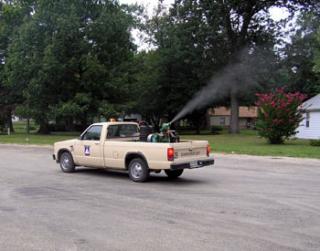Mosquito Abatement Program

The warm weather and increased outdoor activity present another season of mosquito control of the City of Salem Public Works Department. Mosquitoes are an all too familiar summer nuisance. In addition to their irritating bites, mosquitoes also can transmit diseases such as encephalitis, West Nile virus, and malaria to man, and heartworm to dogs. The mosquitoes common to southern Illinois are the inland floodwater mosquito (Aedes vexans), the most abundant pest mosquito in Illinois; the Salt-Marsh mosquito (Aedes Sollicitans); and the northern house mosquito (Culex Pipiens), the transmitter of St. Louis Encephalitis.
All mosquitoes develop in water. The adult female lays her eggs on standing water or in places that later become flooded. Eggs are laid in batches of 50 to 200. In warm weather, the eggs of most mosquitoes will hatch in two to three days. A day or two after emerging as an adult, the female mosquitoes are ready to bite. Male mosquitoes do not bite. They feed on flower nectar or plant juices. Adult mosquitoes rest in grass, shrubbery, or other foliage.
Mosquito control can be effective by utilizing a combination of the elimination of breeding places and chemical control. Because all mosquitoes require water in their first stages of development, the reduction or elimination of mosquito breeding sites is the most effective way to reduce mosquito populations because it permanently reduces or removes the source of mosquito production. Homeowners can eliminate breeding sites on their properties by the following methods:
(1) Empty, remove, cover or turn upside down any receptacle that would hold water - particularly old bottles, tin cans, and old tires.
(2) Empty small toddler-size wading pools weekly and make certain your swimming pool is cared for properly.
(3) Change water in birdbaths weekly. Empty pets’ water pans daily.
(4) Clean clogged roof gutters.
Individuals can also use personal repellents or area repellents for limited areas, such as patios and gardens. Neither electric “zappers” (ultraviolet) nor “buzzers” (sonic) have been found to significantly reduce biting to humans.
The City of Salem utilizes larvacide pellets or briquettes for control of mosquito larvae in storm sewer catch basins and creek areas. The method of mosquito control most familiar to the public is space spraying (ground adulticiding). Truck mounted units spray along the streets and alleys in the community in the evening to kill flying adult mosquitoes. The fog machine Salem uses is a ULV (ultra-low volume where particles are in micron size) and provides only temporary relief from adult mosquitoes. Feeding and flight activity of adult mosquitoes are concentrated within three hours after sunset.
Adult mosquitoes can migrate up to five miles from breeding sites. Because all approved adulticides dispersed by the machine must come in contact with the adult mosquito to be effective, no lasting effects are gained by this method.
Personnel who conduct mosquito control for government agencies are licensed by the Illinois Department of Agriculture. The City of Salem presently has three licensed operators on staff and uses only products approved by the Environmental Protection Agency.
Even the most effective mosquito control program cannot totally eliminate mosquitoes. By using personal repellents and following label instructions carefully and practicing mosquito abatement around your property, the result will be increased enjoyment of summer outdoor activities.

